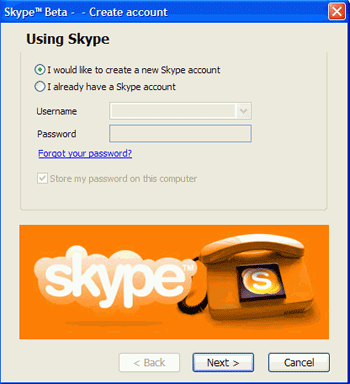Founded
in August of last year by the brain trust behind the (in)famous Kazaa peer-to-peer file-sharing
program, Skype is touted as
being the first true peer-to-peer telephony program. Essentially, the technology
that made Kazaa so successful (and difficult to sue) is being used to power
voice communication over the Internet.
What makes this method
distinct is that it lacks a central 'server' containing user data and connection
information. Each system running Skype becomes a node in a vast network of Skype
users, who share the necessary database information required to keep each user
informed of who is online at any given moment. Calls may also be routed through
other Skype 'nodes' when direct communication is unfeasible.
The idea of Skype is to have a
self-maintaining network of users, who can communicate with each other by voice
just as they would communicate using an instant messenger program like ICQ.
Distance and location are irrelevant as long as you are connected to the
Internet. There are no costs or time limitations attached to calling.
You have 'buddy' lists just like ICQ or MSN, and can search the Skype database
for people to contact.
The makers of Skype also tout
its ability to pass through conventional firewall devices and applications
mostly unscathed, a feat which has given pause to previous VoIP software
applications. While the Skype site is not too forthcoming about how this is
accomplished, it seems to use much the same method as recent Kazaa
implementations. In other words, it uses a dynamic assortment of TCP ports to
connect and send data, falling back on port 80 (the standard HTTP port used to
connect to web servers) if it is blocked elsewhere. The software uses a single
UDP port (or port 80 again) to listen for incoming data.
While Kazaa's ability to
negotiate firewall security has made it a scourge to company sysadmins
everywhere, Skype promises to use the technology for a much more beneficial
purpose: user friendliness.
 How many people have firewalls
built into their home Internet sharing devices and have no idea how
to configure them? A lot. And once Service pack 2 for Windows XP is
released, factor every single Windows XP user into the equation, since the XP
firewall will be enabled by default by the service pack.
How many people have firewalls
built into their home Internet sharing devices and have no idea how
to configure them? A lot. And once Service pack 2 for Windows XP is
released, factor every single Windows XP user into the equation, since the XP
firewall will be enabled by default by the service pack.
Several previous VoIP implementations have been
handicapped by their dependence on a static set of ports which are often blocked
by default with the average firewall. While these ports can be opened, most
users may not have the desire to get this technical.
As
we said, Skype is still in beta testing. The manufacturers
have stated that while they intend to keep the core service free after it clears
beta testing (though no doubt ad subsidized), they
will offer premium memberships with perks like conference calling (currently free in
the beta) and voice boxes that would be desired by a more business
oriented user base.
There is a general move towards VoIP solutions in
the market, with some suggestions that Microsoft will integrate VoIP into its
next Windows version, or release a product or add-on even sooner.
